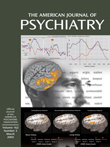Association of a Functional Polymorphism in the Serotonin Transporter Gene With Abnormal Emotional Processing in Ecstasy Users
Abstract
OBJECTIVE: The long-term effects of the use of 3,4-methylenedioxymethamphetamine (MDMA, or Ecstasy) in humans are controversial and unclear. The authors’ goal was to assess the contribution of a functional polymorphism in the gene encoding serotonin transporter to changes in emotional processing following chronic Ecstasy use. METHOD: They investigated Beck Depression Inventory scores and performance on the Affective Go/No-Go test, a computerized neuropsychological test sensitive to emotional processing, in Ecstasy users and comparison subjects, stratifying the results by serotonin transporter genotype. RESULTS: Ecstasy use was associated with higher Beck Depression Inventory score and abnormalities in the Affective Go/No-Go test in individuals with the ss and ls genotype but not those with the ll genotype. CONCLUSIONS: Ecstasy users carrying the s allele, but not comparison subjects carrying the s allele, showed abnormal emotional processing. On the basis of a comparison with acute tryptophan depletion, the authors hypothesize that chronic Ecstasy use may cause long-term changes to the serotonin system, and that Ecstasy users carrying the s allele may be at particular risk for emotional dysfunction.



